Comunitat
5. Community
Would you be able to explain the doctoral thesis in 4 minutes to people who don't understand it?
Rin4', Research in 4 minutes: a competition for doctoral students to improve oral communication skills and become more effective in research dissemination
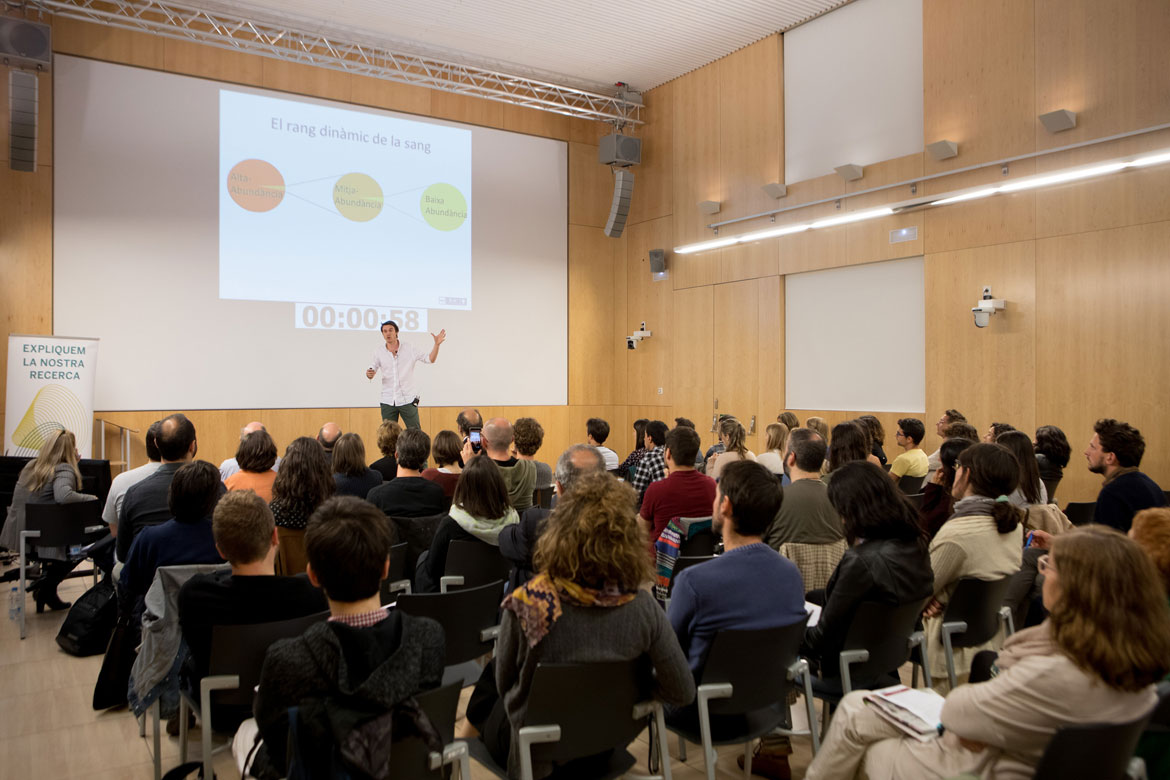
‘Researchers mainly work with public funding; we thus need not only to produce the best knowledge, but also to be able to explain to society what we do.’ With this indisputable argument, Núria Sebastian, director of the UPF Doctoral School, explained one of the reasons for the launch of the Research in 4 Minutes (Rin4’) competition three years ago.
According to Emma Rodero, a lecturer in the Department of Communication specialized in public speaking, ‘A good portion of a researcher’s time is spent on tasks in which oral communication is essential to achieving a goal.’ She cited such commonplace activities as presenting research at a congress or conference, passing a recruitment process before an evaluating committee, or simply successfully defending a doctoral thesis.
“Researchers mainly work with public funding; we thus need not only to produce the best knowledge, but also to be able to explain to society what we do”.
Where did the initiative come from?
The idea arose from Rodero’s own experience during a stay in the US. ‘I was surprised by the number of training initiatives in the field of oral communication skills for students from all disciplines.’ Rodero explained, ‘In the US, oral communication is understood to be a basic and essential skill for life and work.’ ‘We are living in the communication era. Knowing how to communicate what you do is thus a necessary skill if you want to succeed and have an impact’, she underscored.
One of the proposals to catch her attention was the contests held amongst master’s degree and doctoral students to present their research. And so Rin4’ was born.
‘The growing popularity of TED Talks and science blogs have made it possible for people who are not communication professionals to share their work’, Sebastian explained. Therefore, ‘the launch of the competition coincided with a generation of doctoral students who are mature in this field, a generation for whom “being in communication” is part of everyday life’.
How does it work?
The dynamic is relatively simple. The doctoral students have to orally present their research to a general audience in no more than 4 minutes. In other words, they have to make an effort to synthesize and simplify their work in order to ensure that their message reaches the audience in an understandable way.
Each presentation is judged on its academic importance, clarity of expression, and the speaker’s capacity and ability to convey his or her ideas and hold the audience’s attention.
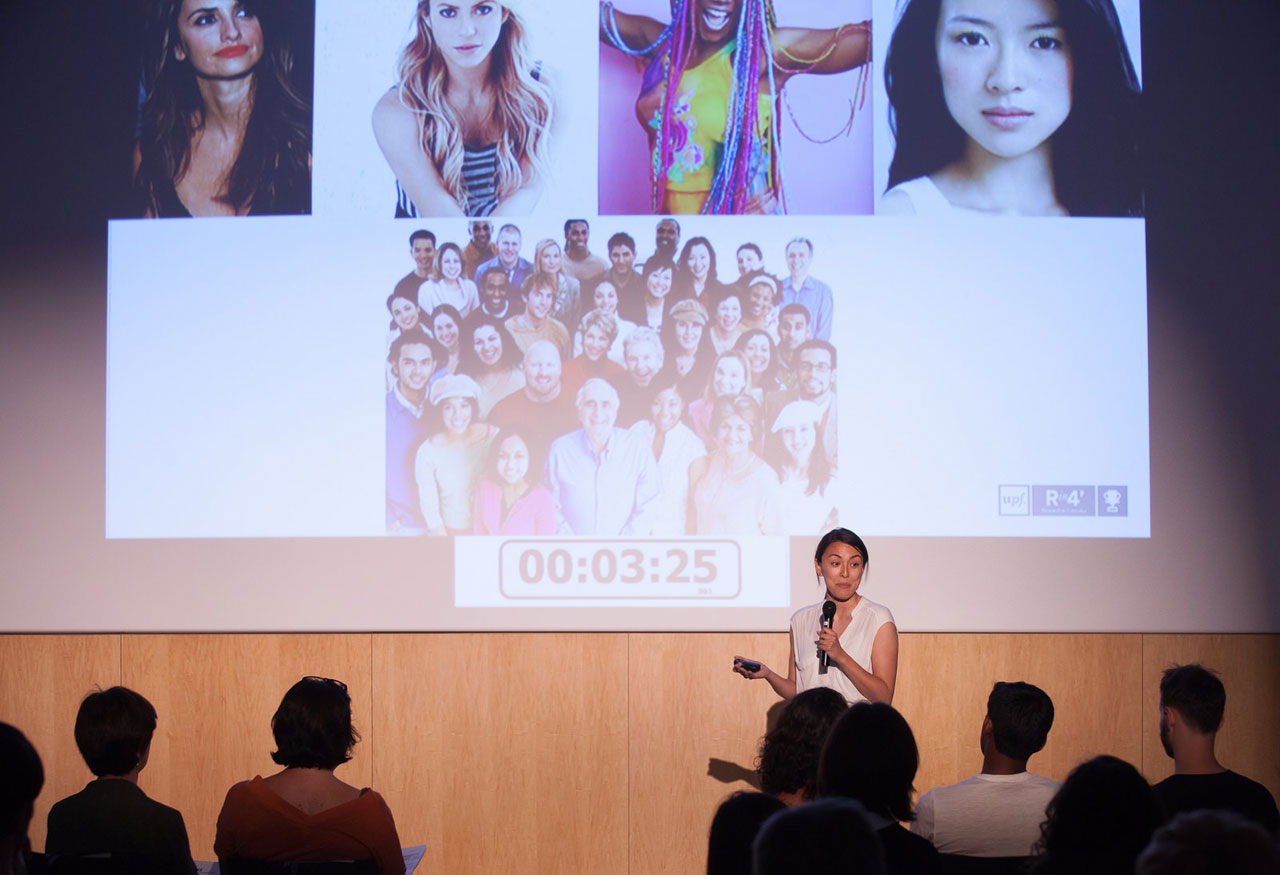
Participants must first successfully complete a series of preliminary classification rounds. Only ten make it to the final round to compete for one of the four prizes: €900 to the first-place presentation, €600 to the second, and €300 to the third, as decided by an inter- and cross-disciplinary jury, and €200 to the winner of the special prize awarded by the audience in attendance at the final.
Prior to the competition, ‘the Doctoral School, in collaboration with the university’s Centre for Learning Innovation and Knowledge (CLIK), offers a course on oral communication for doctoral students’, Sebastian said.
Each presentation is judged on its academic importance, clarity of expression, and the speaker’s capacity and ability to convey his or her ideas and hold the audience’s attention.
The aim of the course, Rodero explained, ‘is to learn how to convey a complex message, such as your doctoral research, in a clear, concise, confident and appealing way’. To achieve this, students focus on three main aspects: crafting their message; the use of voice, posture and gestures; and audiovisual media.
According to Rodero, ‘It is important not to automatically resort to humour to dress up your talk.’ Instead, she said, ‘you need to cultivate empathy in order to understand which aspect of the research might be interesting or directly affect a person and then use that element to hold his or her attention’.
The logistics of Rin4’ are handled by the Postgraduate and Doctoral Studies Office. As explained by Marta Aragay, head of the office, ‘For a few months, part of the staff acts as the Rin team, to organize the entire competition.’ To date, Aragay said, ‘overall participation has been very good; more than 160 doctoral students have competed in the various editions held’. This figure bears witness to the interest in the initiative.
The response from students has been quite positive. The two words most often heard when they are asked how it has helped them improve are certainty and confidence. Rodero corroborated this, noting, ‘The main problem people have when it comes to public speaking is stage fright. In the preliminary classes, we teach them how to control that type of situation.’

What is the challenge for future editions?
‘What we still need to do, as the figures show, is achieve broader participation by all the doctoral programmes’, Sebastian said. She added, ‘There is a sense that Rin4’ is only for science students, but that’s not true at all.’ This is borne out by this year’s third-place prize, awarded to a theoretical linguistics student, and the third-place winner last year as well, who was an economics student. According to Sebastian, ‘The competition will only succeed if candidates from all the doctoral programmes think it is for them and enter.’
Doctoral programme
Total participants per programe
Biomedicine
Communication
Economics, Finance and Management
History
Humanities
Information and Communication Technologies
Law
Political and Social Sciences
Traducció i Ciències del Llenguatge
What are the keys to success for a good presentation?
Recommendations by Emma Rodero
-
Convey that your research is important for society.
-
Explain your message clearly and in a structured way: aim of the research, method and expected outcomes.
-
Use rhetorical devices (metaphors, stories, etc.) to get the audience’s attention.
-
Use audiovisual media or other materials to provide examples of what you are explaining
-
Convey certainty with your voice: energetic intensity, a low pitch, a measured pace.
-
Maintain a sure and stable posture and use gestures to illustrate your explanation.
The winners of the three editions
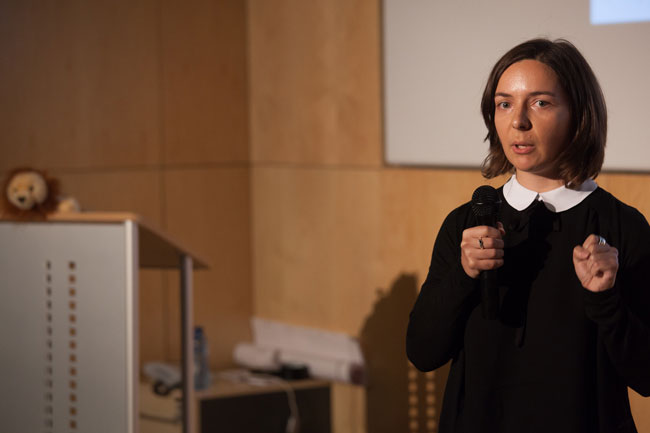
Cristina Galusca, winner of the 2015 edition
“The chance to summarize my ideas and research in 4 minutes seemed like a really fun challenge"
“Eye contact is one of the most common ostensive signs, and also the one to appear earliest in humans”
“For a researcher, the ability to disseminate and share knowledge in a clear, reasoned way is a very important skill and it should be prioritized and valued more highly”
“Making the audience a character in my “story” so that they can identify with the topic and understand the importance of my research”
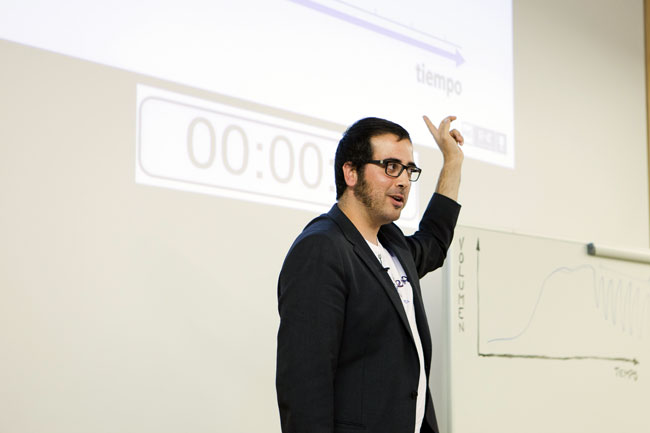
Carlos Toscano, winner of the 2016 edition
“Entering Rin4’ meant championing research with bacteria”
“I have the Platonic hope that someday we will be able to say we know everything about an organism’”
“It is very important to share science; we have to get used to giving ideas without asking for anything in return’”
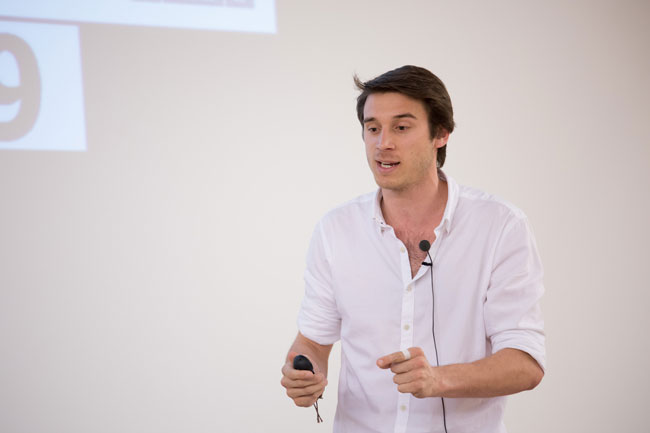
Ferran Nadal, winner of the 2017 edition
“You don’t need to have an outstanding transcript to do research”
“Blood is like a huge pool of ping-pong balls that are all white except for one, which is red. We have to try to hunt down the red one”
“My time playing sports taught me many values applicable to the professional work of a researcher”
